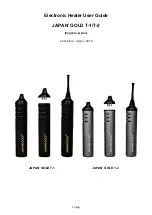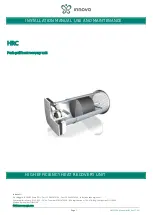
7
Tips
•
Take the time to familiarize yourself with our
device
•
Test the various energy steps of the device.
•
Remember that materials may react differently
•
When choosing the energy step pay attention to
the thickness of the material.
•
Touch the work piece exactly at the point to
welded.
•
Once you are more familiar with the device you
will notice that angle you use to touch the
needle to the work piece will influence the “flow
direction” of the welding spot. An angle of touch
of 90° will result in the deepest welding spot
possible.
•
A saw or file with serrated edges is also very
suitable as additional welding material
•
Allow the needle to clamp in longer for deep-
lying welding spots.
•
It may be helpful to punch out material by chisel
and weld them on.
•
With a little experience you will be able to use
wire to close holes or to add support.
•
If you problems igniting, it may be helpful to
lightly press the needle sideways
. Using this
technique you will be able to push welding spot
in a certain direction.
5-3. GRINDING THE ELECTRODES
Figure 4
The electrodes must be ground on a fine or medium
diamond wheel.
The angle should be about 25°. (Figure 4)
SECTION 6 – MAINTENANCE AND TROUBLESHOOTING
6-1. ROUTINE MAINTENANCE
PUK111 requires a minimum amount of care and
maintenance when used under normal operating
conditions. Please take note of some important points that
will ensure a smooth functioning of your device and
guarantee good service in the years to come.
•
Occasionally check mains plug and cables and
welding cable for damage.
•
Check the movable parts of the hand piece for easy
movement.
•
Occasionally clean the electrode screw connection on
the hand piece to guarantee good contact with the
electrode.
Attention
If fuses have to be replaced, Only replace them with
fuses of the same kind. if overly powerful fuses are
used, the warranty against any possible damage will
no longer be Valid.
The device should only be opened by trained
personnel!

































